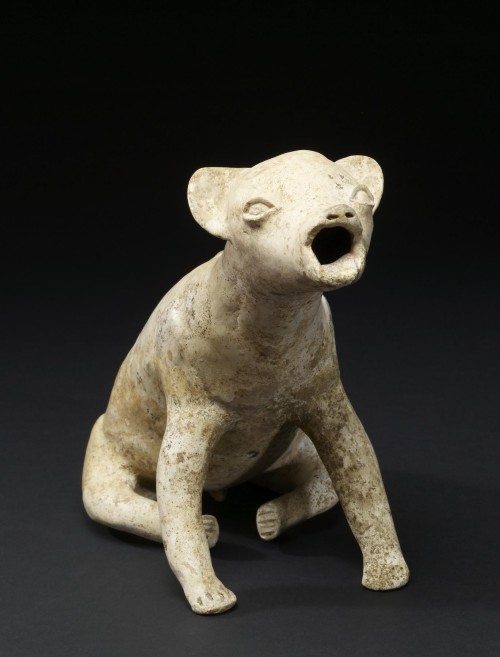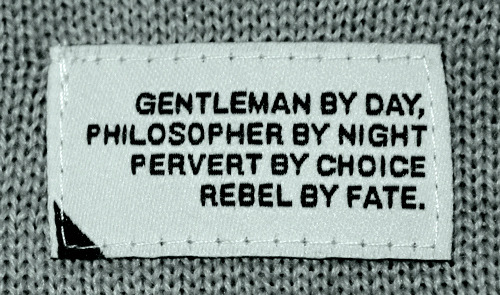Latest Posts by ilunado - Page 3

Virginia Woolf on writing and consciousness in a sublime letter to her lover, Vita Sackville-West

Photographer Uses 130-Year-Old Camera to Capture Images of Modern England Jenny Zhang, mymodernmet.com
In the age of Photoshop, cell phone snaps, and digital photography, British photographer Jonathan Keys stands out with his passion for the collodion (or wet plate) process, an early photographic process that was invented by Frederick Scott Archer …
La nueva Inglaterra, bajo una lente analógica
Los perros de Colima

Howling Dog Effigy, Jalisco, 300 BC-AD 200.
Why were dogs so significant to the Mexica?
Dogs were associated with the god of death, Xolotl, among the Mexicas of the highlands of Mexico. Both a dog and Xolotl were thought to lead the soul to the underworld. The skinny body and white hue of the shown dog represented above may have underworld connotations, connecting it to this belief. Xolotl was also associated by the Mexica with the planet Venus as the evening star, and was portrayed with a canine head.
The dog’s special relationship with humans is highlighted by a number of Colima dog effigies wearing humanoid masks. This curious effigy type has been interpreted as a shamanic transformation image or as a reference to the modern Huichol myth of the origin of the first wife, who was transformed from a dog into a human. However, recent scholarship suggests a new explanation of these sculptures as the depiction of the animal’s tonalli, its inner essence, which is made manifest by being given human form via the mask.
The use of the human face to make reference to an object’s or animal’s inner spirit is found in the artworks of many ancient cultures of the Americas, from the Inuit of Alaska and northern Canada to peoples in Argentina and Chile. (Walters)
On the subject of the significance of dogs, and dog effigies wearing humanoid masks, check out this post from a while back of ‘examples of dogs represented in ancient Mexican art.’ The final artefact here is from Colima, and shows a dog wearing a human mask.
Courtesy of & currently located at the Walters Art Museum, Baltimore, USA, via their online collections, 2009.20.148.
Paisajes de El Greco

View of Toledo by El Greco.
El Greco cultivated other genres more rarely…. His two landscapes, View of Toledo (c. 1610; New York, Met.) and View and Plan of Toledo (Toledo, Casa & Mus. El Greco), are also late works of c. 1610. In these El Greco is preoccupied with the means of representing what is perceived as well as an emblematic sense of the urban landscape and a zenithal projection of the city, a combination that was advanced in the representation of urban topography. It is possible that in Toledo and Madrid these works influenced interest in still-life and in landscape, genres that had, almost exclusively, been orientated towards a naturalistic type of formal structure.
From 'Greco, El [Theotokopoulos, Domenikos [Dominico; Dominikos; Menegos]]' in Grove Art Online on Oxford Art Online.
We’re examining inspiring landscapes this July on the Oxford Academic Tumblr.
Image credit: View of Toledo. El Greco. c.1599. Metropolitan Museum of Art, New York City. Public domain via WikiArt.
"...a corrected version of history helps the people better understand themselves. Americans, Mexicans, the fusion of the two, in addition to people of the world, would recognize a better sense of their true identity & culture. The exploration of such history can perhaps allow for analysis of current rates of depression, crime/incarceration, and socioeconomic status(es). If we, the people, want to understand ourselves, we need to know the truth".

The following is a summary & analysis of Harvard Civil Rights-Civil Liberties Law Review article, “Law of the Noose: A History of Latino Lynching” Richard Delgado.
SUMMARY
Delgado attempts to shed light on a largely unknown history of Latinos, particularly Mexican-Americans in the Southwest...
Jonny Greenwood plays Steve Reich's Electric Counterpoint @ Glastonbury 2014
The neuroscientist Antonio Damasio explains how minds emerge from emotions and feelings.
We have social practices in relation to which we are in a situation much like that of the Greeks with slavery. We recognise arbitrary and brutal ways in which people are handled by society, ways that are conditioned, often, by no more than exposure to luck. We have the intellectual resources to regard the situations of these people, and the systems that allow these things, as unjust, but are uncertain whether to do so, partly because we have seen the corruption and collapse of supposedly alternative systems, partly because we have no settled opinion on the question . . . how far the existence of a worthwhile life for some people involves the imposition of suffering on others.
Bernard Williams, Shame and Necessity (p. 125)
When art conservators in the United Kingdom were cleaning a 17th-century Dutch seascape, they found a surprise: an image of a beached whale that had been hidden for at least 150 years.
Oh, You never expect a whale!

A man in a town married twenty women. There have been no divorces or annulments, and everyone in question is still alive and well. The man is not a bigamist, and he has broken no laws. How is this possible? Where Do Eureka Moments Come From? : The New Yorker
La ‘sensibilidad’ cubre un amplio grupo de contenidos: el sensorial, el sensacional, el sensitivo, el sensible y el sentimental, junto con el sensual. Incluye casi todo, desde el mero choque emocional y físico hasta la sensación misma presente en la experiencia inmediata. Cada término se refiere a alguna fase y aspecto real de la vida de una criatura organizada, en tanto que la vida se produce a través de los órganos de los sentidos. Pero la sensación, en el sentido de estar tan directamente incorporada a la experiencia que ilumina el significado de ésta, es el único que expresa la función de los órganos de los sentidos cuando se conduce a plena realización. Los sentidos son los órganos a través de los cuales la criatura viviente participa directamente en los sucesos del mundo que lo rodea. En esta participación la maravilla y el esplendor variados de este mundo se hacen reales para él, en las cualidades que experimenta.
J. Dewey

La primera persona en dibujar una cadena alimenticia fue Pieter Bruegel, el viejo… su sorprendente dibujo [“The big fisch eat the small ones”] fue hecho en 1556. Incluye lo que bien podría ser un temprano mensaje ecologista mostrando un análisis de la comida (aparentemente con un largo cuchillo de pan) y lo que puede ser un temprano biólogo aplicado…parcialmente transformado en un pez por absorber a un pez que también ha comido a un pez… Elton, Charles, The Ecology of Invasions by Animals and Plants, v. p. 126.
Cuando de proteger la biodiversidad se trata, cualquier otro valor debe quedar subordinado a los resultados provisionales de la investigación inteligente y cooperativa, a la valoración en caso de conflicto, a la revisión y al consecuente reacomodo del sistema de valores característico de una racionalidad práctica y crítica. Tras el último siglo de serios destrozos en la biosfera, quizá no quepa aspirar a otra cosa que a ser mejores predecesores y evitar que las generaciones futuras nos reprochen que la cortedad de nuestros intereses y de nuestras lealtades haya sido más fuerte que nuestra obligación de cuidar la biodiversidad y procurar su continuidad. Un ambiente con facebook, twitter y skype, pero sin ranas, sin manatíes o sin monos araña es decididamente un ambiente de valor menguante.
Esteban, J. Miguel (2013), Naturaleza y Conducta Humana. Conceptos, valores y prácticas para la educación ambiental. Ed. Palibrio: Bloomington.
Not necessarily in that order...

LOOK AT THE DOG!
— me every time there is a dog regardless of the situation (via guy)
It’s important to walk There are friends yet to meet My dog says “Forget about it!” My dog says “Let’s run in the woods”
De lo que no se puede hablar es mejor callar.

Ludwig Josef Johann Wittgenstein (1889-1951)…filosofo
Había tardes en que la ciudad
como en estado de sitio
a causa del calor
no me impedía llegar hasta ti
y el estado de sitio
y el soldado arriba armado
mientras yo perseguía muros altos
para refugiarme
y el soldado arriba armado
hasta que podía encontrarte
y el estado de sitio
Pero no lo creas
Porque otras veces a mitad de la calle…
I was born very far from where I’m supposed to be so I’m on my way home.
Bob Dylan (via heyfranhey)




